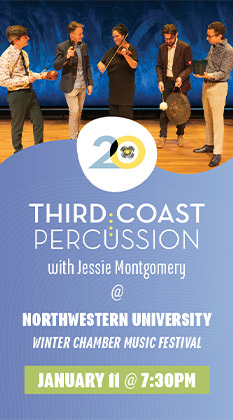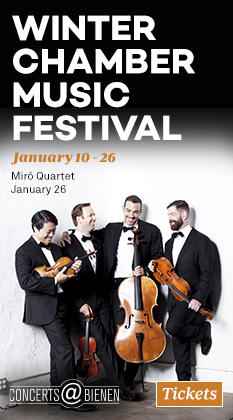Rarities by Schubert and Britten get tender loving care from Kalmar, Grant Park Chorus

Carlos Kalmar’s penchant for taking the Grant Park Orchestra and Chorus well beyond the safely populist confines of your typical summer festival fare has long been among the most welcome hallmarks of his tenure as artistic director and principal conductor of the Grant Park Music Festival. He did so again for the penultimate program of the 2021 festival Wednesday evening at Pritzker Pavilion in Millennium Park.
His enterprising agenda consisted of relatively intimate choral-orchestral and chamber orchestra works written for performance in European parish churches—and, in the case of the young Felix Mendelssohn’s Sinfonia No. 8 in D Major, the small concert halls of early 19th century Germany.
The sound engineers did their best to surround Franz Schubert’s Mass in G Major and Benjamin Britten’s Rejoice in the Lamb—both works receiving their festival premieres—with an appropriately churchy acoustical ambience. To an extent, however, everyone’s earnest efforts ran up against the ambient noise of the bustling summer lakefront, which required a degree of indulgence from audience members.
It was all the more remarkable, then, that Kalmar and company maintained their concentration, delivering purposeful, deeply felt performances that “spoke” through the sonic distractions, which included wailing ambulance sirens, mysterious crashing noises and the like. Remarkable too was the pandemic-be-damned spirit that has made the 2021 festival more than typically impressive for orchestral and choral performance.
Kalmar’s ability to prepare difficult, often unfamiliar symphonic repertory on short order has been tested as never before this summer. For his part, chorus director Christopher Bell has done an amazing job of preparing his splendidly responsive singers for disparate vocal challenges ranging from Vivaldi to Haydn to Bruckner. One had assumed that first-rate choral performance wouldn’t stand a chance against the scourge of Covid-19—and one was happily proved wrong.
With pandemic protocols back in place across the Chicago area, Kalmar and all his instrumental and choral forces wore masks, except for the wind players and vocal soloists.
Schubert was in his 18th year when he composed the G-Major Mass (D.167). His compact setting of the Ordinary of the Latin Mass stands among the most ideally proportioned liturgical works of its kind. The foreshortened text is presented simply and straightforwardly, with absolute sincerity of expression. The abundance of melody is as much to be appreciated as the pristine writing for three soloists, chamber chorus and orchestra. To the original scoring for strings and organ Schubert later added parts for paired oboes, bassoons and trumpets, and timpani, which were included in the performance heard on Wednesday.
Kalmar in his brief spoken remarks likened the mass to an exquisite crystal vase in terms of its construction and content—why tamper with perfection by over-interpreting? And so he contented himself mainly with enforcing clear, well-balanced, well-blended execution, trusting his chamber chorus, orchestra and solo singers to do their jobs. The women’s voices rose joyously to the fervent lift-off of “Et resurrexit” in the Credo, with crisp antiphonal exchanges a further plus.
There was a capable team of soloists in soprano Kaitlin Foley, tenor Joe Shadday and bass-baritone Dan Richardson, all members of the Grant Park Chorus. The standout was Foley with her angelically pure timbre and the absolute technical security with which she soared to perfectly placed and sustained high notes.
Like so much of Britten’s music, his festival cantata Rejoice in the Lamb (1943) makes an effect by not trying to make an effect. The poem that forms the basis of the eight discrete songs (for soprano, alto, tenor and bass soloists, choir and chamber ensemble) was written by the eccentric English poet Christopher Smart while he was confined to a madhouse in the 1760s for what was called at the time “religious mania.”
The 19-minute cantata, by turns whimsical and exalted, typifies Britten’s genius at word-setting. At the composer’s request, Imogen Holst (daughter of composer Gustav Holst) transcribed the original organ part for a chamber ensemble of woodwinds, horn and percussion for performance at Britten’s Aldeburgh Festival in 1952; it was that version presented on Wednesday.
Kalmar had the measure of the piece, bringing to it a keen sense of drama while shaping phrases in such a way as to compensate for its essential introspection. The 35 choristers were crisply on top of their pattering declamation in the penultimate section, and everyone worked hard and well to project the words, notably in the concluding “Hallelujah” and the playful sections depicting the “valour” of a lowly mouse and the piety of the poet’s beloved cat, Jeoffry.
Mendelssohn was, like Schubert, a precocious musical talent whose great gifts were fully formed in boyhood. His dozen adolescent string symphonies were written primarily as composition exercises during his period of study under the pedagogue Carl Friedrich Zelter. The best of them must have surpassed his teacher’s wildest expectations. Although the mature Mendelssohn dismissed these works as unimportant juvenilia, they amply merit revival for what they tell us of his early development.
The Eighth Sinfonia, by far the most popular and widely performed of the set was heard in its revised version which was expanded to include timpani and pairs of woodwinds, horns and trumpets. Mozart rears his smiling visage throughout this opus by the 14-year-old Mendelssohn, melodic grace and all.
Kalmar kept this ingratiating score perking along briskly, securing crisp rhythmic attacks and warm string tone while maintaining an all-important lightness of touch.
The final program of the Grant Park Music Festival takes place 6:30 p.m. Friday and Saturday at the Pritzker Pavilion. The program offers Handel’s Dettingen Te Deum, Gabriela Lena Frank’s Elegia Andina, and Mozart’s Violin Concerto No. 3 with soloist Vadim Gluzman. gpmf.org.
Posted in Performances


